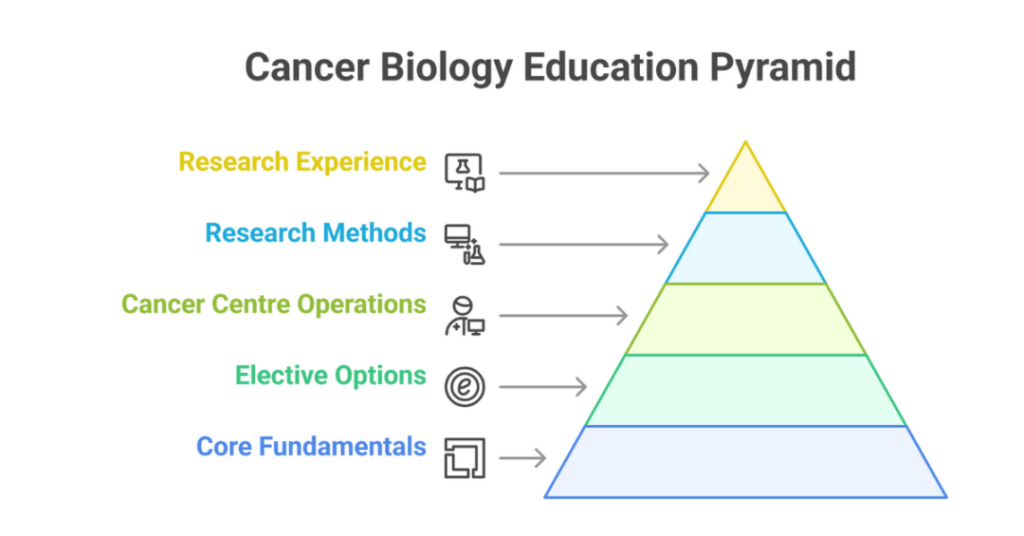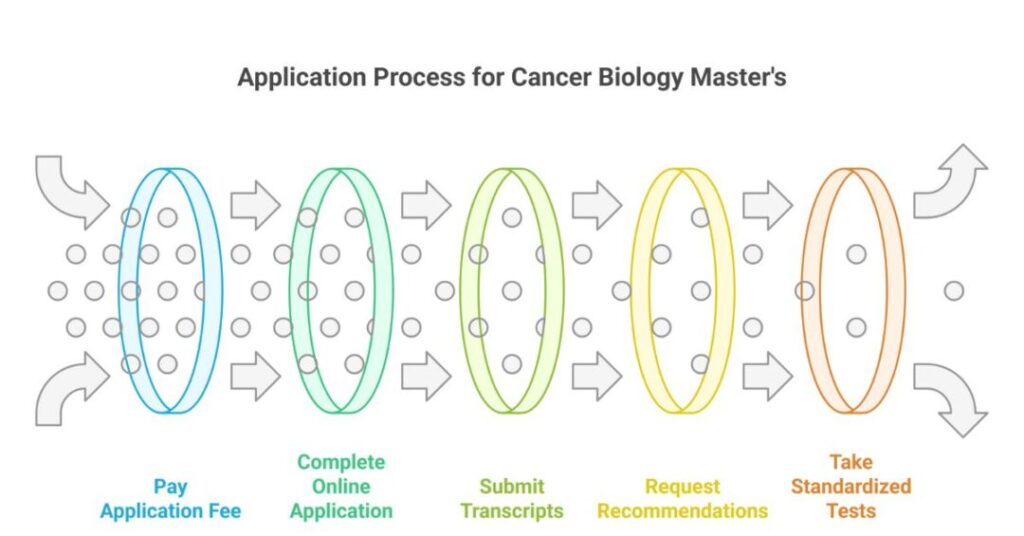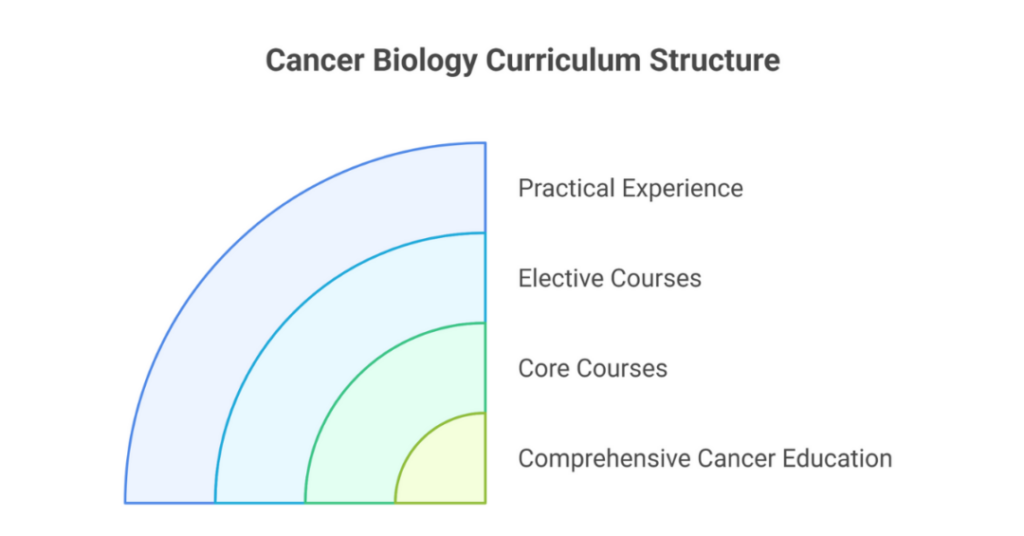20 June 2025
7 minutes read
Masters in Cancer Biology In USA: Top Universities for Master of Science in Cancer Biology for Indian Students

Key Takeaways
- Masters in Cancer Biology in USA offers advanced research opportunities in oncology, immunotherapy, and molecular biology.
- Masters in Cancer Biology in USA equips students with hands-on lab experience and access to cutting-edge cancer research facilities.
- Masters in Cancer Biology in USA opens career paths in biotech, pharmaceuticals, and doctoral programs focused on cancer sciences.
Cancer biology isn’t just a field of study; it’s a journey into the heart of one of humanity’s greatest challenges. Imagine standing at the forefront of medical science, unraveling the mysteries of rogue cells that have puzzled us for centuries.
A Master’s in Cancer Biology and Cancer Biology graduate programs aren’t merely just degrees—it’s an invitation to join a global quest at leading schools of medicine, armed with cutting-edge technology and surrounded by brilliant minds all working towards a common goal: understanding cancer to defeat it.
This path offers more than just scientific knowledge; it provides the opportunity to make a tangible difference in people’s lives. Every discovery, no matter how small, has the potential to change the course of someone’s battle with cancer.
It’s a field where the thrill of scientific breakthrough meets the profound satisfaction of helping others. In cancer biology, you’re not just studying cells and genes; you’re exploring hope, resilience, and the unyielding human spirit that drives us to overcome even the most daunting obstacles.
What Is Cancer Biology and Cancer Research?
Cancer biology is a dynamic field that explores the intricate mechanisms behind the development, progression, and treatment of cancer. A Master of Science in Cancer Biology offers students a deep dive into this crucial area of study.
This program provides comprehensive coursework that combines core fundamentals with elective options, allowing students to tailor their education to their specific research interests.
The science in cancer biology program typically includes intensive study of cancer centre operations, treatment and prevention strategies, and cutting-edge research methods. Students gain invaluable research experience, often working alongside leading experts in state-of-the-art facilities.
Program requirements usually include official transcripts showing a minimum GPA of 3.0, demonstrating the academic rigour expected in this field.
Top Universities for Masters in Cancer Biology in USA
According to the National Cancer Institute, cancer remains the second leading cause of death in the United States, with an estimated 1.9 million new cases diagnosed in 2023 alone.

This sobering statistic underscores the critical importance of cancer research and the need for highly trained professionals in the field of cancer biology.
| University | Cancer Biology Programs/Research Centers | Notable Achievements/Contributions |
|---|---|---|
| MD Anderson Cancer Center | Renowned for cancer treatment and research; collaborative initiatives | Pioneered CAR-T cell therapy; extensive clinical trials |
| Memorial Sloan Kettering | Focus on cancer treatment, research, and education | Pioneered bone marrow transplant; breakthrough therapies |
| Johns Hopkins University | Comprehensive cancer research and treatment programs | Discovered key cancer-related genes; advances in surgery |
| Dana-Farber Cancer Institute | Leading in cancer treatment and research | Extensive work in immunotherapy; genetic research |
| Stanford University | Strong emphasis on cancer biology and genetics | Contributions to cancer genomics; pioneering technologies |
| Fred Hutchinson Cancer Research Center | Focus on cancer prevention and treatment | Key role in bone marrow transplantation; immunotherapy |
| University of California, San Francisco (UCSF) | Leading cancer research and treatment programs | Pioneered cancer stem cell discovery; advances in precision medicine |
| University of Texas (Southwestern Medical Center) | Strong cancer biology and therapeutics programs | Research in tumour immunology; contributions to drug discovery |
Curriculum Of Cancer Biology and Biomedical Science at Top Schools of Medicine
The Master’s program in Cancer Biology offers a comprehensive and cutting-edge education in the molecular and cellular basis of cancer. This curriculum is designed to equip students with advanced knowledge and research skills to understand the complexities of cancer initiation, progression, and treatment.
| Core Courses | Elective Courses | Practical Experience |
|---|---|---|
| – Cellular and Molecular | – Immunology and Cancer | – Laboratory Research |
| Basis of Cancer | – Cancer Genomics and Proteomics | – Research Projects |
| – Cancer Pathophysiology | – Tumor Immunology and Immunotherapy | – Hands-On Techniques |
| – Molecular Oncology | – Cancer Therapeutics and Drug Development | – Data Analysis and Interpretation |
| – Cancer Genetics | – Advanced Topics in Cancer Biology | – Collaboration with Faculty and Peers |
| – Cancer Signaling Pathways | – Bioinformatics and Computational Biology | – Presentation of Research Findings |
| – Experimental Oncology | – Ethical Issues in Cancer Research |
What Are The Eligibility Criteria and Admission Requirements into the Top Colleges of Medicine?
Top universities in the USA have established rigorous admission criteria to ensure that incoming students are well-prepared for the challenges and opportunities that lie ahead.

While specific requirements may vary between institutions, there are common elements that most programs look for in potential candidates. These criteria are designed not only to assess a student’s academic background but also their potential to contribute meaningfully to the field of cancer research.
- Bachelor’s Degree: Candidates typically need a bachelor’s degree in a related field, such as biology, biochemistry, or biomedical sciences.
- GPA Requirement: Many US universities focuses on a competitive GPA of 3.0 or higher in undergraduate coursework.
- English Proficiency: For non-native English speakers, demonstrating proficiency in English through standardized tests like CEFR, TOEFL or IELTS is often mandatory.
- Letters of Recommendation: Applicants are usually required to submit letters of recommendation from academic references or professional.
- Statement of Purpose: Crafting a compelling statement of purpose that outlines your motivation, goals, and passion for cancer biology is crucial.
- Official Transcripts: Submitting official transcripts from previous educational institutions is a standard part of the application process.
- Application Deadline: Each program may have its application deadline, and it’s vital to adhere to these deadlines.
- Additional Requirements: Some programs may request additional materials like a resume/CV or writing samples. Be sure to review specific program requirements.
Career Prospects in Postgraduate and Graduate Program in Cancer Biology and Average Salaries
Graduates with a Master’s in Cancer Biology can pursue various paths, from research-intensive roles to positions in clinical settings or the pharmaceutical industry. As the demand for expertise in cancer research and treatment continues to grow, so do the career prospects and earning potential in this field.
Here’s an overview of some common career paths and their average salaries:
| Career Path | Job Description | Average Salary (Annually) |
|---|---|---|
| Research Scientist | Conducts cancer-related experiments and research, analyzes data, and contributes to scientific advancements. | $82,090 – $130,230 |
| Laboratory Manager | Oversees laboratory operations, manages staff, ensures safety compliance, and facilitates research projects. | $68,790 – $123,770 |
| Oncology Consultant | Provides expertise and guidance on cancer treatment options, patient care, and clinical trials. | $73,520 – $204,060 |
| Biotechnology Professional | Works in biotech companies to develop cancer therapies, diagnostic tools, and treatment strategies. | $80,840 – $147,350 |
| Cancer Epidemiologist | Studies cancer patterns and risk factors conducts epidemiological research, and informs cancer prevention efforts. | $66,220 – $130,500 |
| Cancer Educator | Educates patients, families, and communities about cancer prevention, early detection, and treatment options. | $45,450 – $87,650 |
| Pharmaceutical Researcher | Conducts research to develop and test new cancer drugs, contributing to advancements in cancer treatment. | $74,160 – $134,020 |
| Clinical Research Manager | Manages clinical trials and research projects related to cancer treatments and therapies. | $72,970 – $153,780 |
| Cancer Genetic Counselor | Provides counseling and support to individuals at risk of hereditary cancer, offering genetic testing guidance. | $62,230 – $116,360 |
What Is The Application Process For a Counselling Master In Cancer Biology?
Applying for a Master’s program in Cancer Biology typically involves several steps designed to assess your academic background, research potential, and commitment to the field.

While the specific process may vary between institutions, here’s a general overview of what you can expect:
- Required Documents: Gather essential application documents, which often include:
- Transcripts from previous educational institutions.
- Letters of recommendation from academic or professional references.
- A well-crafted statement of purpose outlining your motivation, career goals, and passion for cancer biology.
- Standardized test scores (e.g., GRE, TOEFL/IELTS for non-native English speakers) if required.
- Application Fee: Prepare to pay the application fee, as most universities charge a fee for processing applications.
- Online Application: Complete the university’s online application form, ensuring that all sections are filled out accurately.
- Application Deadlines: Pay close attention to application deadlines; they can vary from program to program. Submit your application well in advance to avoid missing deadlines.
- Program-Specific Requirements: Review the specific requirements of the Master of Science in Cancer Biology program you’re applying to. Some programs may request additional materials like a resume for abroad or writing samples.
- Transcript Submission: Arrange for official transcripts to be sent directly to the university from your previous educational institutions. Ensure they reach the admissions office by the specified deadline.
- Letters of Recommendation: Request letters of recommendation from your chosen references early in the application process. Provide them with sufficient time to write and submit their recommendations.
- Statement of Purpose: Write a winning personal statement that highlights your academic and research interests, as well as your dedication to cancer biology.
- Standardized Tests: If required, register for and take any necessary standardized tests (e.g., GRE or English proficiency exams) and ensure that your scores are sent to the universities you’re applying to.
- Application Review: Once your application is submitted, the university’s admissions committee will review your materials, assess your qualifications, and make admission decisions.
- Notification: After the review process, the university will notify you of their admission decision. Be prepared to receive acceptance, rejection, or waitlist notifications.
- Acceptance and Enrollment: If admitted, follow the university’s instructions for accepting the offer of admission and enrolling in the program. This may include paying enrollment fees and submitting additional documentation.
- Financial Aid: If you’re seeking financial aid or scholarships, research and apply for relevant opportunities early in the application process.
- Visa (International Students): If you’re an international student, begin the visa application process as soon as you receive your acceptance letter.
Conclusion
At last, it’s not just about hitting the books or peering through microscopes – it’s about joining a band of modern-day explorers, each driven by a shared mission: to understand and ultimately defeat one of humanity’s oldest foes.
This journey isn’t for the faint of heart. It’s challenging, sure, but it’s also incredibly rewarding. Picture yourself working alongside passionate researchers, each day bringing new discoveries and “aha!” moments.
You’re not just learning facts; you’re unravelling mysteries that have puzzled brilliant minds for centuries.
Seize the opportunity to study in the USA, where innovation meets tradition in education.
Ambitio’s comprehensive support will guide you through selecting universities, preparing for entrance exams, and understanding the cultural landscape, ensuring a smooth transition and successful academic experience in the United States.
FAQs
Can international students apply for Masters in Cancer Biology in USA?
Yes, international students are eligible to apply for Masters in Cancer Biology in USA, provided they meet academic and language proficiency requirements.
What are the admission requirements for Masters in Cancer Biology in USA?
Admission to Masters in Cancer Biology in USA typically requires a bachelor’s in biology or related field, GRE scores, and a strong statement of purpose.
Are scholarships available for Masters in Cancer Biology in USA?
Many universities offering Masters in Cancer Biology in USA provide scholarships, assistantships, or research funding to support eligible students.
How long does it take to complete a Masters in Cancer Biology in USA?
The duration of a Masters in Cancer Biology in USA is usually 2 years, including coursework, lab rotations, and research thesis.
What career options follow a Masters in Cancer Biology in USA?
Graduates of Masters in Cancer Biology in USA can work in research, academia, or industry, as Masters in Cancer Biology in USA equips them with specialized oncology skills.
Is work experience required for applying to Masters in Cancer Biology in USA?
While not always mandatory, work or lab experience strengthens applications to Masters in Cancer Biology in USA, as most Masters in Cancer Biology in USA programs value hands-on skills.
Which are the top institutions offering Masters in Cancer Biology in USA?
Top universities for Masters in Cancer Biology in USA include Harvard and Johns Hopkins, both offering world-class Masters in Cancer Biology in USA programs focused on innovation.

You can study at top universities worldwide!
Get expert tips and tricks to get into top universities with a free expert session.
Book Your Free 30-Minute Session Now! Book a call now




























